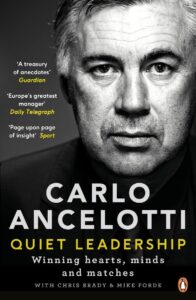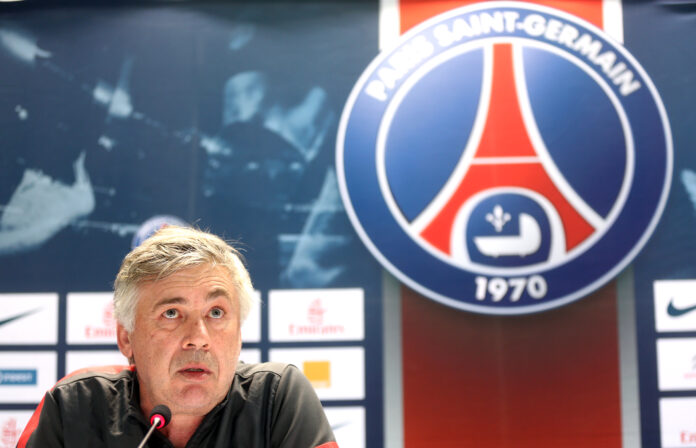Series: Leading the Game: Leadership in Football
A series exploring how football executives can lead with clarity, purpose, and resilience in today’s game.
“I have never shouted at anyone to get respect. I have always listened, and tried to understand.”
— Carlo Ancelotti
Introduction
Leadership books are everywhere, but few of them feel truly human. Quiet Leadership by Carlo Ancelotti, or Don Carlo as I like to call him, stood out to me immediately. It was not just another book of motivational slogans or top-down strategies. Instead, it felt calm, personal, and respectful.
Reading it, I could see why players trusted him, why clubs across Europe sought him out, and why he is known for his understated authority. He leads without shouting. He listens, understands, and then acts.
One thing that made me instantly warm to Don Carlo was discovering that The Godfather is one of his favourite films. It is also my favourite book and movie, and in Quiet Leadership he references it more than once. It made perfect sense to me. The respect, the calm authority, the quiet power that comes not from fear but from trust.
This is not a typical book review. It is a reflection on what Quiet Leadership taught me about football, leadership, and the kind of qualities I believe every executive should try to develop.

Why Quiet Leadership Resonated with Me
What struck me most about Quiet Leadership is that it stands apart from so many other leadership books that focus on charisma, dominance, or big motivational speeches. Don Carlo’s approach is rooted in respect, listening, and calm authority. He shows that leadership is not about being the loudest voice in the room but about understanding the people you lead.
His style reminded me of the servant leadership model that was first described in the 1970s. That concept is now fifty years old, and leadership thinking has evolved a lot since then. But Don Carlo brings it to life in a modern, real-world context. He does not just serve for the sake of being liked. He serves to build trust, align his teams, and achieve real results.
Reading the book, I felt like he had mastered the balance between empathy and authority. He understands that respect is not given automatically just because of a title. It has to be earned every day through consistency, humility, and clear communication.
What I loved most is that Ancelotti’s philosophy is not complicated. It is simple, but not easy. He models calm under pressure, shows emotional intelligence in tough situations, and focuses on building relationships first. For me, this is what true leadership should look like, on and off the pitch.
Key Themes and Lessons from the Book
Calm Authority
One of the strongest lessons I took from Don Carlo is that authority does not have to be loud or aggressive. Throughout Quiet Leadership, he explains how staying calm under pressure builds confidence in those around you. Players, staff, and even fans respond to a leader who does not panic, who thinks before acting, and who offers stability when emotions run high.
Key Takeaway: Calm leadership creates trust and steadies the team in tough moments.
Building Relationships and Trust
One of my favourite stories in the book is about how he convinced Adriano Galliani of AC Milan to hire him. Instead of a formal meeting in an office, Don Carlo invited Galliani to his home and cooked him an incredible pasta dinner using the best ingredients. It is such a human moment that I felt like I was there at the table.
This is not just charm. It is intentional leadership. Ancelotti knows trust cannot be demanded. It must be built slowly, with respect and genuine connection. For any executive, this lesson is clear: relationships matter more than hierarchies.
Key Takeaway: Building trust means meeting people on their level and showing respect beyond titles and roles.
Managing Big Egos
Ancelotti has coached some of the world’s biggest stars, and he shares in the book how he approaches these players. Instead of challenging them publicly or trying to dominate them, he speaks privately, listens carefully, and treats them as people first.
He knows that players respond better when they feel heard, respected, and valued. His approach is subtle but effective. For leaders in any field, it is a reminder that managing talent is not about control but about understanding individual motivations.
Key Takeaway: Leading high performers requires empathy, respect, and private, honest communication.
Adaptability Across Cultures
Don Carlo is one of the few managers to win in Italy, England, France, Germany, and Spain. But his success was not about imposing a single style everywhere. He adapted to the local football cultures without losing his own values of calm and trust.
Before joining Chelsea, he took English lessons so he could communicate properly with his players and staff. It was not easy for him, but he understood that speaking their language, both literally and culturally, was essential to building trust. Humility and preparation are essential qualities in any leader.
Key Takeaway: True leadership adapts to culture, values communication, and respects the people you lead.
Personal Reflections
Reading Quiet Leadership was more than just studying a successful football manager’s playbook. It felt like listening to a wise mentor who understands people. Don Carlo’s style resonates with me deeply because it shows that leadership does not have to rely on force or authority alone. It can be built on respect, listening, and genuine human connection.
When I learned that The Godfather is one of Ancelotti’s favourite movies, I smiled immediately. It is my favourite book and film too. In the book, he references it more than once, using it as a model for calm, quiet authority that earns loyalty without fear. That connection made me like him even more. It is the kind of leadership that is subtle but strong, respected rather than enforced.
I also appreciated his humility. The story about learning English before managing Chelsea is a perfect example. He did not assume he could lead without making the effort to understand his players and communicate clearly. That level of preparation and respect is something I believe every leader should strive for.
These are the kinds of lessons I think every football executive, and in truth every leader, should consider. Leadership is not about being the loudest voice in the room. It is about understanding people, adapting to different situations, and building trust one conversation at a time.
Conclusion
Quiet Leadership is not a book filled with flashy slogans or complicated models. It is a thoughtful, honest account of how one of football’s most successful managers leads with respect, calm, and understanding.
For me, Don Carlo’s approach is a reminder that true leadership is not about power plays or dominating the room. It is about trust, humility, and the willingness to meet people where they are. It is about preparing carefully, listening closely, and adapting without losing your core values.
I believe these lessons are valuable for anyone in football or business who wants to build stronger teams and more resilient organisations. Quiet Leadership is more than a guide for managers. It is an invitation to think deeply about how we lead, how we communicate, and how we earn the respect of those around us.
Every executive can learn from Don Carlo’s calm, respectful, and human approach to leadership. It is a blueprint for leading with purpose, clarity, and quiet strength.

